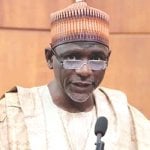Kaduna state governor, Mallam Nasir el-Rufai has accused the former management of the Nigerian Telecommunications Limited (NITEL) of wasting $7 billion of Nigeria’s money.
The governor added that management also frustrated the efforts to privatize the telecom behemoth.
El-Rufai said this at the 20th anniversary and Awards Night of the Association of Licenced Telecommunications Companies of Nigeria (ALTON) over the weekend in Lagos.
The governor, who received the Industry Achiever’s Award for his contribution to the development of the telecom sector, narrated the efforts of President Obasanjo made to deregulate the sector and the role he played as director-general of the Bureau of Public Enterprises (BPE) to sell NITEL.
“NITEL has died. It was an evil institution that was temping this country, rendering telecom poor services.
“Generally, we targeted the development of the country. We did our best to privatise NITEL because we saw them clearly, we saw what they didn’t see, we saw that they were going to die.
“But they didn’t get it. They thought the world was going to remain the way they want it.
“I did not want the death of NITEL, but they deserve to die. At least, $7 billion of our money went to them.
ALSO READ: Ohaneze lauds Obiano on relationship with South-East traditional rulers
“NITEL was a giant company, but they never wanted any other telecom company in the sector competing with them. The economy is called self-trust but what do we have now?
“NITEL never believed that what is happening today will happen. As the DG of BPE, when he came on board, the first thing they did was to share NITEL’s data connection and made them be more affordable.
Meanwhile, El-Rufai advised former President Olusegun Obasanjo to go ahead tell the Nigerian Communications Commission (NCC) to issue the Digital Mobile Licence (DML) in 2001 which eventually gave birth to the likes of MTN, Airtel, Glo, 9mobile and so many other smaller private telephone operators (PTOs) in the country today.
“NITEL was unwilling to accommodate the private telecom operators (PTOs) that were licensed to provide alternate phone services.
“From the late 1990s to the early 2000s, NITEL’s hierarchy made it difficult for the private telecom companies to get interconnect and exchange facilities from NITEL, which made it difficult for them to operate.
Speaking also, the Chairman of ALTON, Engr. Gbenga Adebayo explained how Nigeria has moved 20 years ago from four cellular mobile networks with limited coverage and 26,500 connected lines.
Adebayo added that there was one national operator with 500,000 connected lines (One telephone line per 400 inhabitants), 35 Internet service providers (ISPs) with approximately 17,000 customer base.
He said the telecom sector contribution at that time to GDP has moved from less than one per cent in 1999 to 11.4 per as at second quarter 2019.
“We have moved from less than $50 million marginal private sector participation and foreign direct investment (FDI) to over $68 billion private investment today,” said Adebayo.
Adebayo noted that PTOs battled absence of policy document articulating sector growth path and development objectives, ineffectual regulatory framework establishing sector regulator and costly access charges, yet unsatisfactory levels of service provision.
WATCH TOP VIDEOS FROM NIGERIAN TRIBUNE TV
- Let’s Talk About SELF-AWARENESS
- Is Your Confidence Mistaken for Pride? Let’s talk about it
- Is Etiquette About Perfection…Or Just Not Being Rude?
- Top Psychologist Reveal 3 Signs You’re Struggling With Imposter Syndrome
- Do You Pick Up Work-Related Calls at Midnight or Never? Let’s Talk About Boundaries







